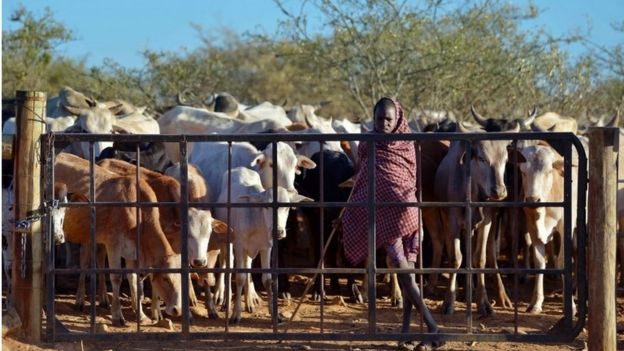
Zimbabwe Redux : Laikipia, Kenya
"Tristan was shot three times, once in the head."
"He was totally unarmed. He went out on a white horse to be totally visible, and he obviously thought he would not be attacked. But he was and that was it."
Martin Evans, rancher, Laikipia, Kenya
"They are regrouping and waiting in the wings."
"They will be back."
Laikipia farmer
"We don't allow people to just walk onto the land."
"We'd been talking to the local community for two months, but the young warriors who were driving the cattle came and said 'we don't want to speak to anyone, we're coming to take the grass, by force, so don't get in our way."
"We realised that it wasn't them but local politics had changed their minds and that was disappointing."
"It's not about drought. The reality is there are too many people and too much livestock and it's a global thing."
"It's not about white ranchers - it's about the whole community. There's a landscape of different peoples here who are suffering."
"People have been misused and told to go and destroy property - destroy the wildlife - try to destroy the livelihood of the place so you can take over."
Anne Powys, rancher
 |
| A group of Pokot herders at Sosian Ranch in Laikipia County after a night of vigil on March 10,2017. PHOTO:KIPSANG JOSEPH |
group of Pokot herders at Sosian Ranch in Laikipia County after a night of vigil on March 10,2017. PHOTO:KIPSANG JOSEPH
Read more at: https://www.standardmedia.co.ke/article/2001232453/a-night-out-with-invading-herders-at-laikipia-ranch |
A week ago, 60-year-old former British army officer Tristan Voorspuy, turned farmer in Kenya, had gone out on a horse to determine the extent of damage to his ranchland that had been trampled by thousands of cattle and vandalized as well by the armed men that had driven the cattle on to the ranch. He had named his ranch Sosian, a large plot of land once wilderness that he had transformed into a wildlife conservation area, as well as a thriving cattle farm.
He never returned home. A day after he had set out police were dispatched to find out what had happened to him. The Kenyan area of Laikipia comprised of mostly white-owned ranches but black Kenyans as well, began experiencing invasions by native herdsmen accompanied by armed and seemingly trained fighters with ammunition to spare. Perusing the spent casings left behind after a raid, have identified them as army-issued.
The sprawling ranches in Laikipia have been developed with tens of thousands of acres of grazing land. During times of seasonal drought they have always been subjected to invasions by herdsmen driving their cattle through to pasture. It is only in the space of the past year that those invasions have been accompanied by organized violence and destruction. The death of Tristan Voorspuy is the first time a white farmer has been killed.
Through speculation, informed sightings and talk, farmers in the area are convinced there exists a core of 200 to 1,000 armed men representing the Samburu and Polkot ethnic tribes that are involved in the invasions. They are thought to be supported by vehicle and motorcycle groups communicating via two-way radios. "They are well organized, well resourced and clever in their planning -- they are a militia", stated Maria Dodds, accustomed now to wearing a flak jacket when she drives about her family's 8,000-acre ranch, after repeated attacks.
Many suspect that the Kenyan government no longer controls swaths of one of its thriving tourism, conservation and farming regions, surrendered to a powerful tribal militia. During the year after the invasions started, up to twenty people have died, killed by the invaders, three among them black farm workers. A month ago the government advanced extra police into Laikipia but each time the officers mounted an operation, the invaders' superior numbers and weaponry forced them back.
A local Member of Parliament is alleged to use vernacular radio communications to inform his supporters that ranch leases have expired and the time has come for his Samburu people to reclaim their historic land. Samburu MP Matthew Lempurkel, running for re-election in August, denies those suspicions. Some of the invaders have been seen to be wearing "Vote Lempurkel" tee-shirts, and photographs taken of them.
"This is definitely much broader than Lempurkel", said one rancher, citing unconfirmed suspicions that the governor of a region nearby was involved in shipping weapons smuggled out of Ethiopia to the invaders.
 |
|
|
Labels: Colonialism, Conflict, Kenya, Settlers

<< Home